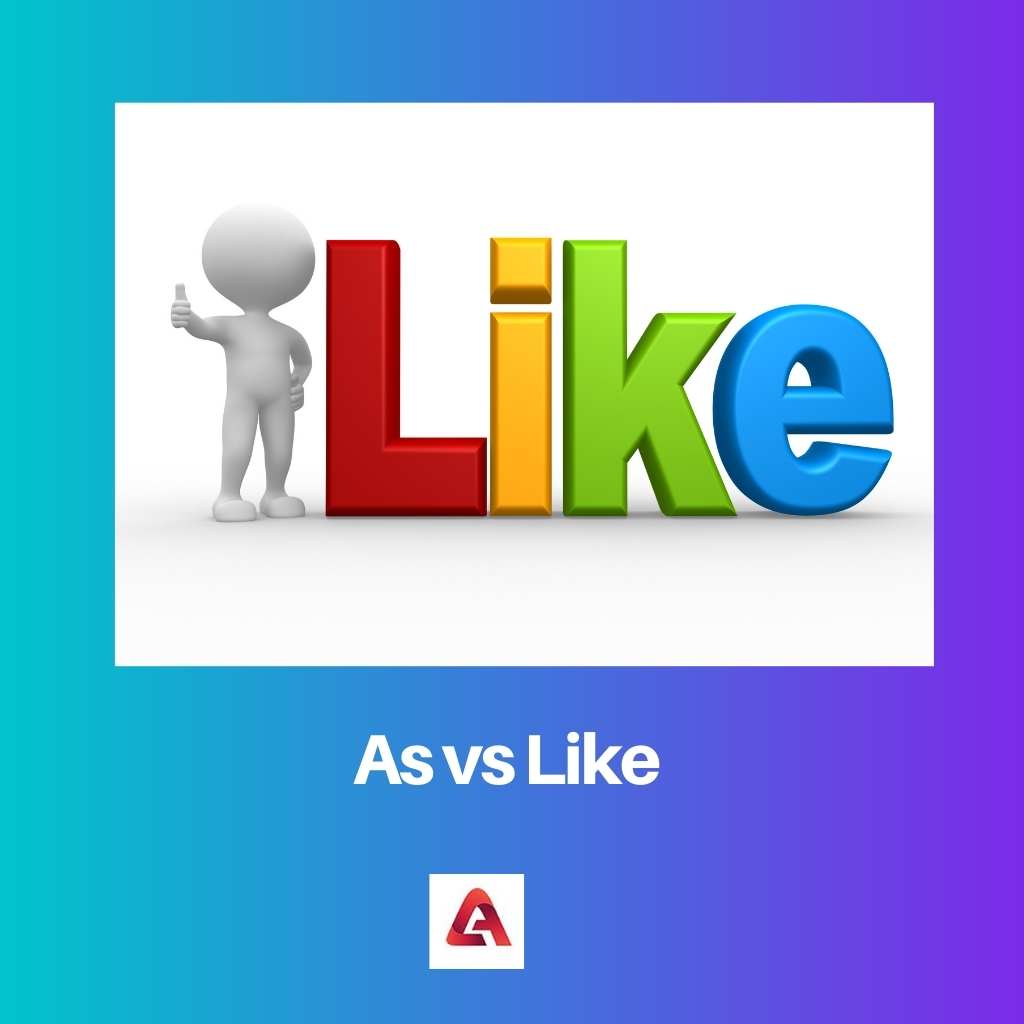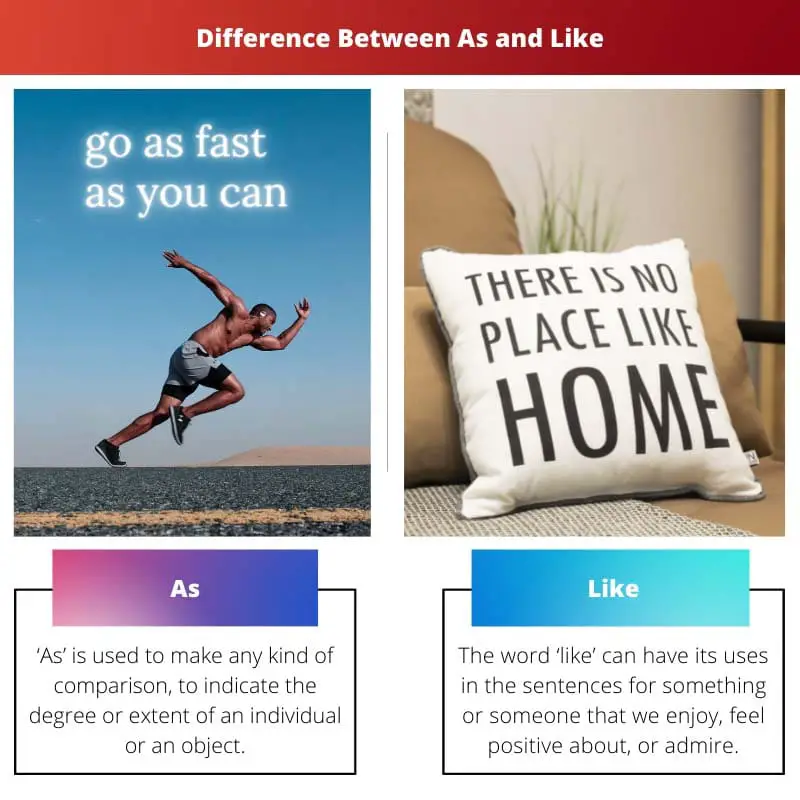Many English students have trouble knowing when it comes to the usage of words namely, as and like. The rule related to as and like has several distinctive parts.
As a result, as and like can be difficult mainly for students to use both the words in a proper manner.
The rule understanding is essential due to the word mix-up is considered a mistake most of the time. Technically, both as and like are fails to use interchangeably.
It means that both words have to be used in different kinds of situations. In this article, the chief aim is on differentiating as and like.
Key Takeaways
- “As” functions as a conjunction, connecting two clauses or phrases, while “like” is a preposition, relating a noun or pronoun to another element within a sentence.
- “As” can indicate similarity, role, or function, whereas “like” primarily denotes similarity or comparison.
- An example of “as” usage: “She works as a teacher.” An example of “like” usage: “He runs like the wind.”
As vs Like
The difference between as and like is that “As + Noun, Phrases/ Noun” is the form in which usage of ‘as’ can be done when the speaker wants to say something is acting similarly as something else. On the other hand, “Like + Pronoun/ noun phrase/ noun” is the form in which usage of ‘like’ can be done to compare stuff.

Generally, ‘as’ is used to make any kind of comparison, to indicate the degree or extent of an individual or an object. It might also refer to the qualities, job, or function of an individual.
Moreover, it can also have its usage in the context of “in the same way that”. We use ‘as’ when the two things simultaneously take place.
The word ‘like’ can have its uses in the sentences for something or someone that we enjoy, feel positive about, or admire.
Also, ‘like’ indicate similarity for instance when something or someone resembles another and we use it in the sentence. For drawing attention towards the type of an action done then also ‘like’ used.
Comparison Table
| Parameters of Comparison | As | Like |
|---|---|---|
| Meaning | In the same way | ‘The same as’ or ‘similar to’ |
| Usage | To highlight the function, appearance, or job | To give some examples |
| Formal | More formal | Less formal |
| While comparison | Followed by a clause | Followed by a noun phrase |
| When followed by noun | Refers to ‘in the role of’ | Refers to ‘the same way as or similar to’ |
What is As?
As is used to express similarity while in a distinctive way comparison to like. Grammatically, the word namely, as is a conjunction.
It simply means that as links parts of clauses or sentences. An instance of this point is the sentence, “Spanish is used by people in Colombia, as they do in Peru.”
In the above instance, as is needed here due to the combination mainly “they do” is a clause. As an English non-native speaker, usage of as should always be there in particularly formal situations.
Also, in writing the usage of as is required. The second usage is to talk about rules. Instances of roles are characteristics like mother, man, vegetarian, student, Catholic, and many more.
Someone can think of a role as anything vital about them. While describing a person’s role then the usage of as is done compared to like.
The usage with jobs comes up most frequently. For instance, you should say, “Ray works as a secretary,” not “Ray works like a secretary.”
Final usage of as can also be done to mean because. For instance, you can make the sentence “Laura is not going out tonight as already it’s very late.”
It is possible only to use it as an alternative if the speaker is sharing any information that is already known to the listener.

What is Like?
Like is a verb that means to enjoy. But this is not the rule’s part that students find difficult. Grammatically, the word like can also be a preposition.
It means that the word like links two nouns. Like is also used to express similarity while in a distinctive manner than as.
For instance, we can say, “Jenner is like her mother” which means both Jenner and her mother are similar. So, the word likewise mainly comes from this like’s definition.
Likewise means in the same way that is an adverb. Like, can be modified with words such as just, quiet, extremely, and other adverbs of degree.
It is also usual to use like in collocations such as feel like, look like, smell like, seem like and sound like. These expressions mean sound similar to, look similar to, feel similar to, etc.
The usage of like is also done to introduce examples. People say, “Spain is famous for foods like ham, tapas, and paella” because ham, tapas, and paella are instances of famous Spanish foods.
“Spain is famous for foods as ham, tapas, and paella” is the incorrect form through which students sometimes make sentences. However, it is also probable to use such as when we use to like to introduce examples.

Main Differences Between As and Like
- When it comes to parts of speech, ‘as’ can be used as an adverb, conjunction, and preposition. On the flip side, ‘like’ can be used as a conjunction, noun, adverb, adjective, and preposition.
- The synonyms of the word ‘as’ are even as, whilst, simultaneously, while, though, and many more. On the other hand, some of the ‘like’ word synonyms are such as, viz, for example, in particular and for instance.
- In terms of instances, the usage of the ‘as’ word instance is that as I told you, I would be moving to Dehradun, this week. In contrast, the usage of the ‘like’ word instance is that talking to Ray is like talking to a 2-year-old baby.
- The origin of the word ‘as’ can be traced from alswa which is from old English and further reduced to form the word ‘as’. Meanwhile, the origin of the word ‘like’ can be traced from the likr word which was of old Norse and quite related to alike.
- The usage of the word ‘as’ can be done in the form of “As + Noun Phrases/ Noun” when the speaker wants to say something is acting similarly as something else. On the contrary, the word ‘like’ can be used in the form of “Like + Pronoun/ noun phrase/ noun to compare stuff.”

References
- https://scholar.google.com/citations?view_op=search_authors&mauthors=as+&hl=en&oi=ao
- https://iovs.arvojournals.org/article.aspx?articleid=2122332
